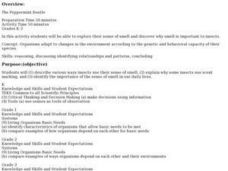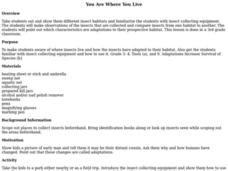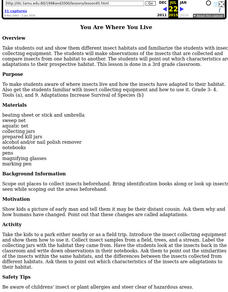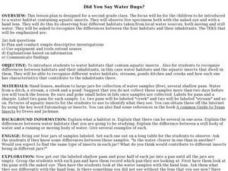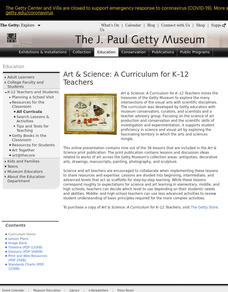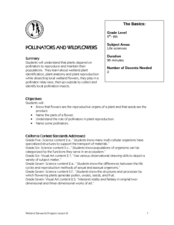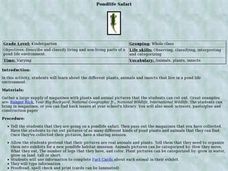Curated OER
Tall, Dark, and Handsome
Seventh graders determine the characteristics of insect families after comparing human family characteristics. They categorize insects by looking for similar characteristics on image cards.
Curated OER
The Peppermint Beetle
Learners describe various ways insects use their sense of smell, and examine why some insects use scent marking. They conduct a scent hunt, searching for a particular scent on the trees on school grounds.
Curated OER
Classroom Animals & Pets - Insects & Company - Butterflies
Students examine the life cycle of a butterfly. They place caterpillars in a cage and observe their change to a butterfly. Students discover how much a caterpillar eats and annotate growth information.
Curated OER
One is a Snail, Ten is a Crab.
Students count by pairs and sets of feet, while reading a story that coincides with this practice. In this math lesson, students use their skills to count by multiples and adding on to numbers when they add up feet from humans, and...
Curated OER
Wanted!!
Fourth graders study insects in their habitats looking at survival characteristics and whether the insect is a predator or an herbivore. They investigate characteristics that improve the survival of a species and its ability to reproduce.
Curated OER
You Are Where You Live
Third graders observe insects in a number of habitats. They recognize which insect characteristics are adaptations to their habitats.
Curated OER
You Are Where You Live
Students explore where insects live and how they have adapted to their environment.
Curated OER
Miracle of Winged Migration
Students explore the life cycle of insects by researching butterflies. In this insect migration lesson, students identify the Monarch butterfly, where they inhabit, and what their migration consists of. Students utilize the Internet to...
Curated OER
Did You Say Water Bugs?
Second graders observe live specimens of aquatic insects in a water habitat. They study specimens from both moving and still water with the naked eye and a hand lens.
Curated OER
Going Buggy!
Students study bugs over a four week period. In this insect collection of activities, students observe insects covering basic science concepts and skills, such as classification, observation, and responses to habitat. Students develop...
Curated OER
Who's the Baddest?
Students are introduced to the realm of social insects, their role in the environment and the biological features that make them unique.
Curated OER
Clearly Classified
Young scholars review the classification system for living organisms and apply it the classification of insects and flowers in the still life by Ambrosius Bosschaert. They create a chart classifying the animals and plants in the painting...
Curated OER
Camouflage
Third graders collect insects and various bits of the insects' habitats in order to develop an understanding of how camouflage makes the insect fit to survive in its environment.
Curated OER
Flower Power
Students explore the parts of flowers and how they reproduce. They dissect flowers and observe the reproductive organs. Students observe anthers and ovaries of Tiger Lilies under a microscope. They investigate how insects and other...
Curated OER
Pollinators and Wildflowers
Students explore how plants depend on pollinators to reproduce. In this pollination lesson students dissect a local flower and collect and identify pollinating insects.
Curated OER
Food Chain
Third graders explore why food chains are important. In this food chain lesson, 3rd graders break into small groups to represent parts of the food chain. Different amounts of food are given to each group and any spilled food will be...
Curated OER
The Disappearing Honeybees: Tracking Honeybee Decline
Students practice graphing and other math skills to track number of honeybee colonies present in United States since 1978, discuss major crops that are dependent on insect pollinators, and examine reasons for decline of United States...
Curated OER
Bee Dance
Everything a bee does serves a purpose. Learners in grades one through five explore the behaviors of bees through reading and dramatic puppet play. First children will create honey bee puppets, then they will discuss how bees dance to...
Curated OER
Native Plant Research Project
Students study indigenous plants. They examine why they are special, why some might be threatened, by what forces (pollution, habitat destruction), and what else relies on the continued existence of these plants (insects, animals). They...
Curated OER
Pond-life Safari
Students determine the living and non-living parts of pond life. In this pond life lesson, students examine the plants, animals, and insects that live in ponds. They look through a variety of print media, cut out pictures, and arrange...
Curated OER
Butterfly Adventure
Students in second grade are paired with fifth grade computer research buddies. They observe the characteristics of caterpillars, and identify the four stages of the caterpillar to butterfly life cycle. They graph the number of...
Curated OER
Animal Alphabet
Second graders identify animals with each letter of the alphabet. In groups, they create a PowerPoint presentation which shows the information they have collected about each one. Using all of this information, they create an animal...
Curated OER
Cows, Worms and Compost
Third graders explore agriculture by viewing a PowerPoint presentation in class. For this animal relationship lesson, 3rd graders identify the types of farm animals humans feed on and their dependency on such small insects like worms....
Curated OER
Monarch Migration
Third graders investigate the life cycle of the Monarch butterfly. They experiment with various tools to simulate the mouth parts of insects, conduct research, record their observations of butterflies hatching, write a play, complete...



